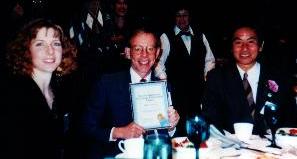September 1992
By Kris Swank
In September of 1992, I had the good luck to travel to Tokyo and Osaka as the ASLA/ Horner Japanese Exchange Fellow. The Fellowship was established by the late Dr. Layton Horner and his wife, Marian, to foster cultural and informational exchange between librarians in Osaka and Arizona. As this year's Fellow, my project was to study libraries that provide business information, and compare them to their counterparts in Arizona.
The most important thing I learned was not to generalize about libraries in Japan. I toured several types of libraries, academic and corporate, large and small, traditional and state-of-the-art. They are as varied as libraries in the U.S. Some leading universities are still functioning with traditional libraries that have primarily closed stacks, but most have installed online catalogs. Other universities, such as Keio and Waseda in Tokyo, have recently built new libraries. These have more open stacks, prominent reference service and lots of automation. Business studies, to Japanese academia, often means economics and scholarly research, instead of professional training after the American MBA model. MBA programs have been established in Japan, but economics research is still prevalent. Each economic department often has its own small library for the use of faculty and graduate students, and supported by faculty research funds. The rich resources in these centers are not incorporated into main library collections. Corporate libraries rely heavily on automation. At the Morgan Stanley Tokyo library, the 8 staff members use at least 5 different database hosts (like DIALOG and Nikkei Telecomm) as well as CD-ROM products. Since the employees of Morgan Stanley need real-time information, the company is willing to support its library's extensive use of automation. Government-run libraries are excellent sources of information for the public. The JETRO libraries (Japan External Trade Organization) are stocked full of information that Japanese and foreigners alike use to research Japanese markets. The American Center Library (under the auspices of the American Embassy) collects information on the U.S. for the benefit of Japanese needing to research American society. The Japanese information industry is not producing as many CD-ROM products as the U.S. In libraries that utilize CD-ROMs, there are inevitably several U.S. disks, like ABI/Infom and InfoTrac. The fact that these are in English is a barrier for many Japanese users. Finally, I need to thank several people who watched out for me in Japan, arranged my visits, played tour guide, and made sure I got on the right trains. In Tokyo, I am very grateful to Thunderbird for housing me at the school's student apartments. Thanks to Thunderbird Professors Suguru Akutsu and Jane Kuo , I made it through morning rush hours on the Tokyo subways. My library tours in Tokyo were arranged by the members of the International Cooperation Division of the National Diet Library (Japan's legislative library). Ms. Chiyo, Ms. Kitagawa and Ms. Sato were not only my guides and interpreters, but also became my friends. In Osaka, I had the privilege to stay with two families, the Yamabes and the Kakiguchis. They took me into their homes, fed me, entertained me and were extremely gracious hosts. I hope I can return the favor someday. My library tours in Osaka were arranged by Professor Tsutomu Shihota, a library instructor at St. Andrew's University. Many will remember that Professor Shihota led a group of Japanese Librarians to Arizona in 1990. I wish to thank all my new friends in Japan for all the kindness they showed me. |
